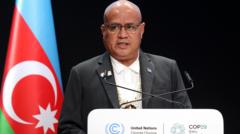In a significant development, Tuvalu, the low-lying Pacific island nation, celebrated the launch of its first-ever cash machines marking a crucial step towards modernizing its banking services for its 11,000 residents.
Tuvalu Introduces First Cash Machines in Historic Banking Milestone

Tuvalu Introduces First Cash Machines in Historic Banking Milestone
Tuvaluan Prime Minister Feleti Teo celebrates the installation of the archipelago's first cash machines, promising a brighter economic future for residents.
The tiny Pacific island nation of Tuvalu has taken a leap into the modern banking era with the unveiling of its first cash machines, a milestone which Prime Minister Feleti Teo described as momentous and historic. The introduction of five cash machines and 30 sale terminals on Funafuti, Tuvalu's main island, will provide essential banking services to the island’s inhabitants for the very first time. This significant event occurred at the headquarters of the National Bank of Tuvalu in the village of Vaiaku, attended by local traditional leaders, parliament members, and business officials.
Prime Minister Teo expressed pride in the achievement, stating, “We've been in an analogue space all along, these were dreams for us.” He emphasized that despite the high cost of setting up the machines, government backing and a strong resolve made it possible to deliver this service to the nation. Unlike before, where residents had to queue at banks to withdraw cash, they can now access their funds with greater convenience, particularly during busy paydays.
Additionally, the new electronic payment systems are set to revolutionize local businesses, enabling shops to process payments electronically for the first time. Although the cash machines currently accept only prepaid cards, the bank has plans to roll out debit and credit cards for international use in the future.
Siose Penitala Teo, head of the National Bank, indicated that this pivotal shift towards electronic banking and payments heralds a new dawn of economic empowerment for Tuvaluans, empowering them with greater financial independence.
Tuvalu consists of nine small islands in the South Pacific, and since gaining independence from the United Kingdom in 1978, it has been actively campaigning against climate change due to the grave threat of rising sea levels. Prime Minister Teo had addressed the COP29 Climate Conference in Azerbaijan last November, alerting global leaders about the perilous situation Tuvalu faces as a result of climate change and the melting of glaciers, raising concerns that the islands could one day be submerged entirely.
Prime Minister Teo expressed pride in the achievement, stating, “We've been in an analogue space all along, these were dreams for us.” He emphasized that despite the high cost of setting up the machines, government backing and a strong resolve made it possible to deliver this service to the nation. Unlike before, where residents had to queue at banks to withdraw cash, they can now access their funds with greater convenience, particularly during busy paydays.
Additionally, the new electronic payment systems are set to revolutionize local businesses, enabling shops to process payments electronically for the first time. Although the cash machines currently accept only prepaid cards, the bank has plans to roll out debit and credit cards for international use in the future.
Siose Penitala Teo, head of the National Bank, indicated that this pivotal shift towards electronic banking and payments heralds a new dawn of economic empowerment for Tuvaluans, empowering them with greater financial independence.
Tuvalu consists of nine small islands in the South Pacific, and since gaining independence from the United Kingdom in 1978, it has been actively campaigning against climate change due to the grave threat of rising sea levels. Prime Minister Teo had addressed the COP29 Climate Conference in Azerbaijan last November, alerting global leaders about the perilous situation Tuvalu faces as a result of climate change and the melting of glaciers, raising concerns that the islands could one day be submerged entirely.




















